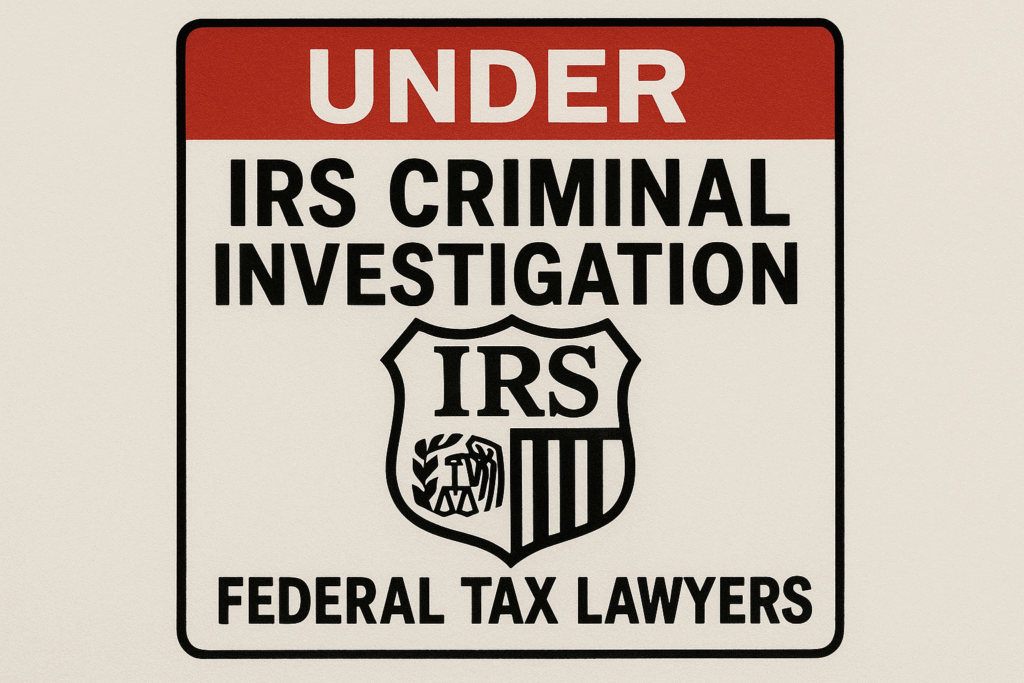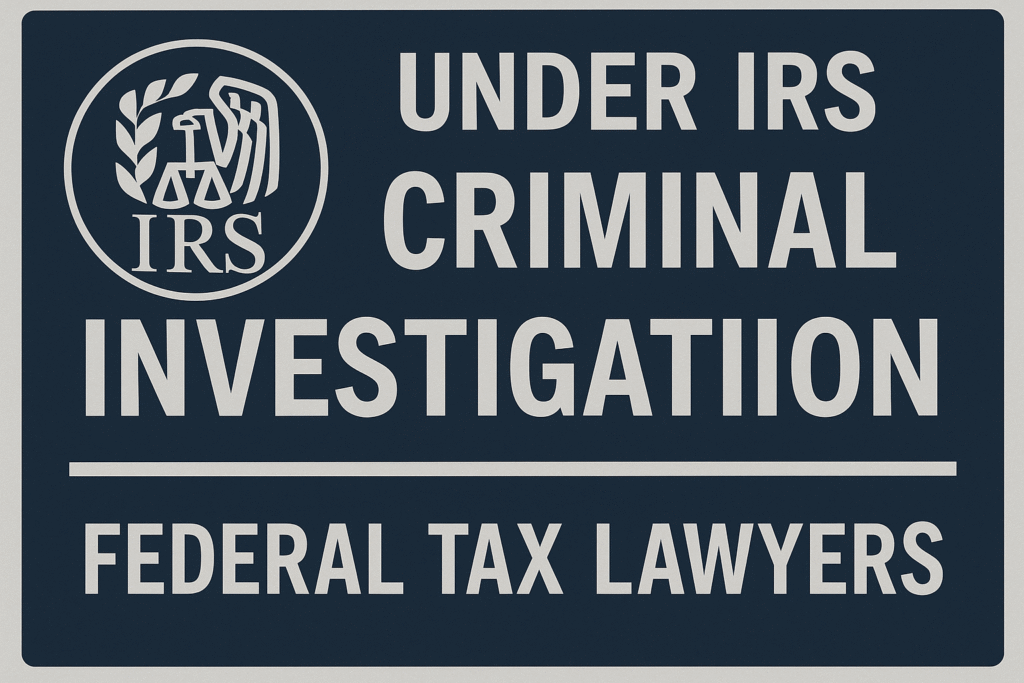Federal Tax Crimes Defense Guide
UNDER IRS CRIMINAL INVESTIGATION OR FACING FEDERAL TAX CHARGES?
IRS Criminal Investigation Division has a 93% conviction rate. Federal tax crimes carry severe penalties including years in federal prison and complete financial destruction. Time is critical in tax crime cases.
Call (312) 566-9173 NOW | Free Case Evaluation
Federal tax crimes represent some of the most aggressively prosecuted white-collar offenses in the federal system. At Adams Defense Law, our experienced federal tax crimes defense attorneys have successfully defended clients against IRS criminal investigations, tax evasion prosecutions, and complex tax fraud cases in Chicago, New York City, and Kansas City.
The IRS Criminal Investigation Division (IRS-CI) has unlimited resources, forensic accounting expertise, and years to build their case. When they recommend prosecution, federal prosecutors almost always file charges. You need defense attorneys who understand federal tax law, IRS procedures, and how to challenge complex financial evidence in federal court.

Types of Federal Tax Crimes We Defend
Tax Evasion (26 U.S.C. § 7201)
Tax evasion is the most serious federal tax crime, involving willful attempts to evade or defeat federal income taxes. This includes underreporting income, claiming false deductions, hiding assets, and using nominee accounts to conceal taxable activities. Penalties: Up to 5 years in prison per count and $250,000 fine Collateral Consequences: IRS civil penalties up to 75% of unpaid tax plus interest
Failure to File Tax Returns (26 U.S.C. § 7203)
Willful failure to file required tax returns when having sufficient income to require filing. This misdemeanor can become a felony when part of a larger tax evasion scheme. Penalties: Up to 1 year in prison per year unfiled and $100,000 fine Enhanced Penalties: Felony charges when part of tax evasion conspiracy
Filing False Tax Returns (26 U.S.C. § 7206)
Filing tax returns containing materially false information, including false income, deductions, credits, or other tax information. Each false return constitutes a separate felony count. Penalties: Up to 3 years in prison per false return and $250,000 fine Pattern Enhancements: Sentences increase dramatically with multiple false returns
Tax Preparer Fraud (26 U.S.C. § 7206)
Tax preparers who file false returns for clients face serious federal charges. This includes inflating deductions, claiming false credits, and creating fictitious tax shelters. Penalties: Up to 3 years in prison per false return prepared Professional Consequences: Loss of preparer privileges and professional licenses
Employment Tax Crimes (26 U.S.C. § 7202)
Willful failure to collect, account for, or pay over employment taxes. Business owners and responsible persons can face both criminal charges and civil trust fund recovery penalties. Penalties: Up to 5 years in prison and $250,000 fine Trust Fund Penalties: 100% personal liability for unpaid employment taxes
Conspiracy to Defraud the IRS (18 U.S.C. § 371)
Conspiracy charges in tax cases involve agreements to impede IRS functions through deceit, craft, trickery, or dishonest means. This broad statute covers many tax avoidance schemes. Penalties: Up to 5 years in prison and $250,000 fine Scope: Can include activities that aren’t independently criminal
Structuring Financial Transactions (31 U.S.C. § 5324)
Structuring involves breaking up financial transactions to avoid currency reporting requirements. Often charged alongside tax evasion when attempting to hide income. Penalties: Up to 5 years in prison and $250,000 fine Asset Forfeiture: Structured funds subject to civil and criminal forfeiture

Fraudulent Tax Shelters and Schemes
Promoting abusive tax shelters, offshore tax evasion, and other tax avoidance schemes can result in serious federal charges under multiple statutes. Penalties: Vary by specific charges but can exceed 10 years in prison Injunctive Relief: Courts can enjoin continued promotion of tax schemes
Federal Tax Crimes Penalties and Enhancements
| Tax Crime | Maximum Prison | Criminal Fine | Civil Penalties | Statute of Limitations |
|---|---|---|---|---|
| Tax Evasion | 5 years per count | $250,000 | 75% fraud penalty | 6 years |
| Failure to File | 1 year per year | $100,000 | 25% failure penalty | 6 years |
| False Returns | 3 years per return | $250,000 | 20% accuracy penalty | 6 years |
| Employment Tax | 5 years | $250,000 | 100% trust fund penalty | 6 years |
| Tax Conspiracy | 5 years | $250,000 | Various civil penalties | 6 years |
| Structuring | 5 years | $250,000 | Asset forfeiture | 5 years |
SENTENCING ENHANCEMENTS FOR TAX CRIMES Federal sentences for tax crimes are significantly enhanced based on tax loss amount, sophisticated means, leadership role, and abuse of trust. Tax loss calculations can include civil penalties and interest, dramatically increasing sentences.
COLLATERAL CONSEQUENCES WARNING Tax crime convictions result in permanent criminal records, professional license revocation, security clearance loss, and lifetime IRS scrutiny. Civil tax liabilities remain even after serving criminal sentences.
IRS Criminal Investigation Defense Process
1. Initial IRS Contact and Special Agent Interview
When IRS Criminal Investigation contacts you, we immediately assess the situation and advise on interactions with special agents. Never speak to IRS-CI without experienced counsel present – they are building a criminal case.
2. Grand Jury Investigation Defense
IRS-CI presents cases to federal grand juries through subpoenas for records and witness testimony. We challenge improper subpoenas, assert applicable privileges, and prepare witnesses for grand jury testimony.
3. Prosecution Declination Efforts
Before charges are filed, we work to convince prosecutors that criminal prosecution is not warranted. This involves comprehensive white paper submissions and negotiations with the U.S. Attorney’s Office.
4. Indictment Response and Arraignment
If charges are filed, we immediately begin aggressive defense preparation, including challenging the indictment, seeking bond, and developing comprehensive defense strategies for complex financial evidence.
5. Discovery and Expert Witness Preparation
Tax crimes cases involve voluminous financial records and complex accounting issues. We work with forensic accountants and tax experts to challenge the government’s financial evidence and loss calculations.
6. Trial Preparation and Plea Negotiations
We prepare for trial while exploring plea negotiations that minimize exposure. Tax crimes trials require sophisticated presentation of financial evidence and expert testimony on complex tax law issues.
7. Sentencing and Asset Protection
If conviction occurs, we present comprehensive mitigation evidence and challenge tax loss calculations to minimize sentences while implementing strategies to protect family assets from civil collection.

Common Tax Crimes Defense Strategies
Lack of Willfulness
Tax crimes require proof of willful intent to violate known legal duties. We present evidence of good faith reliance on professionals, complexity of tax laws, and absence of willful intent.
Reliance on Professional Advice
Defendants who reasonably relied on qualified tax professionals may have complete defenses to tax crime charges. We present evidence of disclosure to professionals and reasonable reliance on their advice.
Challenging Tax Loss Calculations
Federal sentences depend heavily on tax loss amounts. We challenge the government’s loss calculations through expert testimony and alternative theories of proper tax treatment.
Statute of Limitations Defenses
Most tax crimes have six-year limitations periods, but the limitations can be extended by various factors. We carefully analyze timing issues and assert applicable limitations defenses.
Constitutional Challenges
We challenge violations of Fourth Amendment search and seizure protections, Fifth Amendment self-incrimination rights, and due process violations in IRS investigations.
Voluntary Disclosure and Cooperation
When appropriate before charges are filed, we explore voluntary disclosure options and cooperation agreements that may prevent criminal prosecution.
Why Choose Adams Defense Law for Tax Crimes Defense
Federal tax crimes defense requires attorneys who understand complex tax law, federal criminal procedure, IRS investigation methods, and federal sentencing guidelines. Our comprehensive approach includes:
- Tax Law Expertise: Deep understanding of federal tax law, regulations, and IRS procedures
- IRS-CI Experience: Extensive experience with IRS Criminal Investigation procedures and tactics
- Federal Court Experience: Proven track record in federal tax crimes trials and appeals
- Forensic Accounting: Access to top forensic accountants and tax experts
- Asset Protection: Strategies to protect client assets from criminal forfeiture and civil collection
- Professional Network: Relationships with tax professionals for defense preparation
- Early Intervention: Ability to intervene during IRS investigations before charges are filed
- 24/7 Availability: Immediate response for IRS criminal investigations and federal arrests
Understanding IRS Criminal Investigation Process
Administrative vs. Criminal Investigations
The IRS conducts both civil audits and criminal investigations. Once IRS-CI becomes involved, the focus shifts from tax collection to criminal prosecution. Criminal investigations have different procedures and much higher stakes.
Special Agent Powers and Limitations
IRS Criminal Investigation special agents have broad investigative powers but must comply with constitutional requirements. We ensure agents don’t exceed their authority and protect our clients’ constitutional rights throughout investigations.
Grand Jury Secrecy and Subpoenas
IRS-CI uses federal grand juries to investigate tax crimes through witness testimony and document subpoenas. Grand jury proceedings are secret, but we can challenge improper subpoenas and prepare witnesses for testimony.
Prosecution Standards and Declination
The Tax Division of the Department of Justice reviews IRS-CI recommendations for prosecution. We work to demonstrate that prosecution is not warranted based on legal and policy considerations.
Civil vs. Criminal Tax Consequences
Civil Tax Penalties
- Failure to file penalty: 25% of unpaid tax
- Failure to pay penalty: 0.5% per month up to 25%
- Accuracy-related penalty: 20% of underpayment
- Fraud penalty: 75% of underpayment due to fraud
- Trust fund recovery penalty: 100% of unpaid employment taxes
Criminal Tax Penalties
- Prison sentences up to 5 years per count
- Criminal fines up to $250,000 per count
- Supervised release following incarceration
- Restitution to the IRS for tax losses
- Criminal record with lifelong consequences
Parallel Proceedings Issues
Tax crimes cases often involve simultaneous criminal prosecution and civil tax collection. We coordinate defense strategies to minimize exposure in both proceedings while protecting constitutional rights.
Call (312) 566-9173 for immediate tax crimes defense consultation. Available 24/7 for IRS criminal investigations and federal arrests.

Our Offices: Defending Tax Crimes Nationwide
Chicago Tax Crimes Defense
Our Chicago office defends tax crimes cases in the Northern District of Illinois, working with clients facing IRS Criminal Investigation cases and prosecutions by the Chicago U.S. Attorney’s Office. We handle cases involving Chicago-area businesses and individuals facing complex tax fraud allegations.
New York Tax Crimes Defense
New York prosecutes numerous high-profile tax crimes cases in the Southern and Eastern Districts of New York. Our NYC practice focuses on defending executives, professionals, and business owners facing tax evasion and related charges investigated by IRS-CI’s New York field office.
Kansas City Tax Crimes Defense
Our Kansas City office provides tax crimes defense throughout the Midwest, handling cases in the Western District of Missouri and surrounding federal districts. We defend clients facing employment tax violations, tax evasion, and other federal tax crimes.
IMMEDIATE CONSULTATION REQUIRED IRS Criminal Investigations move rapidly once initiated. The sooner we begin your defense, the better we can protect your rights and achieve favorable outcomes.
Call (312) 566-9173 | Start Free Evaluation
Contact Federal Tax Lawyers
Contact Adams Defense Law for Federal White Collar Defense
If you’re facing federal white collar charges or under investigation for financial crimes in Chicago, New York City, or Kansas City, immediate legal representation is crucial.
Federal white collar cases are complex, high-stakes matters that require specialized expertise and aggressive defense.
Call (312) 566-9173 for immediate consultation
Available 24/7 for:
✅ Federal target letters and investigation notices
✅ Grand jury subpoenas and document requests
✅ Federal search warrants and asset seizures
✅ Emergency federal court proceedings
Related Federal Defense Services
- Federal Fraud Defense Lawyer
- Federal Securities Fraud Attorney
- Federal Defense Attorney
- White Collar Crime Defense
- Federal Conspiracy Defense
- Money Laundering Defense
- RICO Defense
- Federal Embezzlement
- Computer Crimes Defense
- Federal Sentencing
Emergency Contact: Call (312) 566-9173 for a confidential consultation. Available 24/7 for IRS criminal investigations and federal arrests.
Free Case Evaluation: Get a confidential assessment of your tax crimes case from experienced defense attorneys at https://adamsdefenselaw.com/criminal-case-evaluation/
Frequently Asked Questions About Federal Tax Crimes
What should I do if IRS Criminal Investigation contacts me?
Never speak to IRS Criminal Investigation agents without an attorney present. Contact Adams Defense Law immediately at (312) 566-9173. Anything you say will be used to build a criminal case against you.
How do I know if I’m under criminal investigation vs. civil audit?
IRS-CI investigations involve special agents with badges and guns, not revenue agents. Criminal investigations focus on willful violations and potential prosecution rather than tax collection.
Can I make a voluntary disclosure to avoid criminal prosecution?
Voluntary disclosure may prevent criminal prosecution in some cases, but timing is critical. Once you’re under criminal investigation, voluntary disclosure options are severely limited.
What is the difference between tax evasion and tax fraud?
Tax evasion under § 7201 requires willful attempts to evade tax, while tax fraud under § 7206 involves filing false returns. Both are felonies but have different elements and penalties.
How does the IRS calculate tax loss for sentencing?
Tax loss includes unpaid taxes, civil penalties, and interest. The calculation method can dramatically affect federal sentences, making expert challenge of loss calculations crucial.
Can I continue my business during a tax crimes investigation?
Continuing business operations during investigation can create additional criminal exposure. We advise clients on compliance measures and potential operational changes to minimize risk.
What happens to my professional licenses if convicted of tax crimes?
Tax crime convictions typically result in professional license revocation or suspension. We work to negotiate plea agreements that minimize professional consequences when possible.
Are there alternatives to federal prison for tax crimes?
Depending on the circumstances, alternatives may include home confinement, community service, or supervised probation. However, tax evasion cases often result in prison sentences.

White Collar Federal Lawyers
Check out our other federal lawyer white collar pages.
⚖️ White Collar Federal Defense Home
⚖️ Federal Securities Fraud Lawyers
⚖️ Federal Tax Crime Defense
⚖️ Federal Money Laundering Lawyer
⚖️ Federal Bribery Corruption Defense
